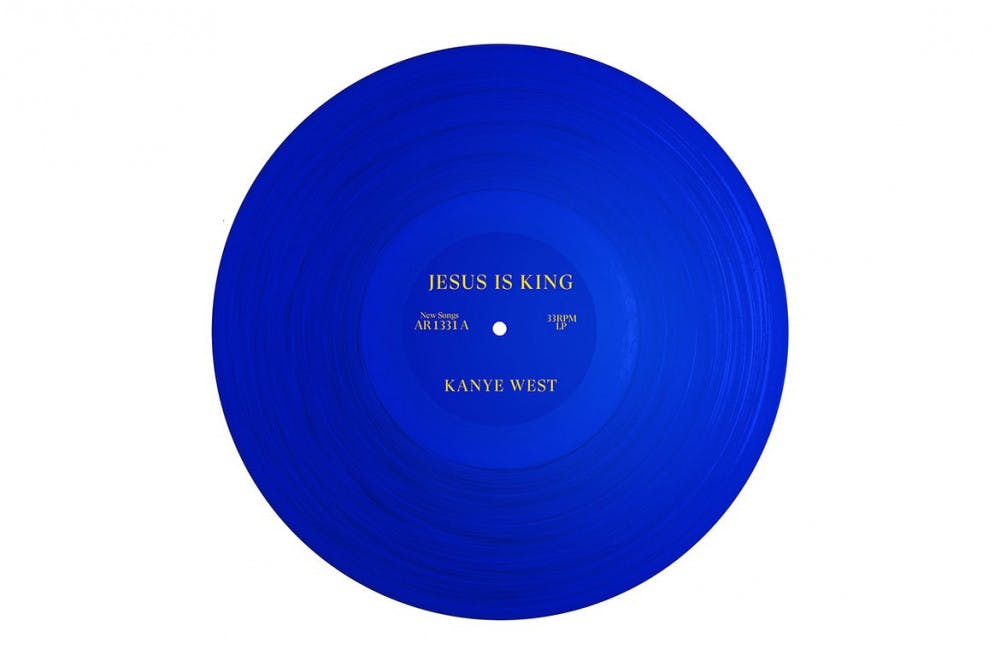“The devil had my soul, I can’t lie,” proclaims Kanye West in “On God,” the fifth track of his long-awaited ninth studio LP, “Jesus Is King.” It is this acknowledgement of past mistakes and creative follies that underscores the thesis of West’s most recent work, the realization of his salvation as a Christian, an international superstar and a human being, just like the rest of us.
No stranger to experimentation with genres other than his native hip-hop, Kanye explores the themes, harmonies, instrumentation and lyricism of gospel music in “Jesus Is King,” taking multiple musical and lyrical risks in the meantime, albeit with mixed results. For everyone from diehard Kanye stans to those disenfranchised by his problematic outbursts (and, shall we say, political alignments), the release of this album served as a chance for Kanye to rectify his recent disappointments and serve as a reminder of his everlasting standing in the canon of modern musical greats. On some accounts, “Jesus Is King” achieves these objectives. On others, it falls short.
The album opens with “Every Hour,” the most traditional gospel song on the record, one that includes no vocals from Kanye himself. West’s Sunday Service choir provides a bright, uplifting entrance, quickly followed by a simple, yet percussive piano providing accent to the already- piercing vocals. The canon-like choral arrangement is impressive and jives for the entirety of the track, yet ends up standing in stark, even off-putting, juxtaposition to the second track, “Selah.” The transition between the two comes off as abrupt and confusing, a trend that continues as the record progresses. “Selah” enters with an ominous organ, almost reminding the listener of the darker side of church music and of Kanye’s spirituality itself.
Here, in Yeezus-like fashion, Kanye expresses his frustration with stardom, professing “I ain’t mean, I just focused.” The song builds with heroic splendor, as the gospel choir enters with a Hallelujah chorus that falls nothing short of epic.
“Follow God,” the third, and arguably most digestible, track on the record follows, opening with a sample of Whole Truth’s 1969 “Can You Lose By Following God,” specifically on the lyric “Father, I stretch my hands to you,” an allusion to West’s 2016 mega-hit, “Father, Stretch My Hands.” “Follow God” is a minute and a half of rhythmic excellence with few shortcomings other than its short length and lack of tonal evolution, not unlike many other tracks on the album. Other highlights of “Jesus Is King” include “Everything We Need,” a tour de force of harmonic production, and “Use This Gospel,” an unorthodox yet tantalizing construction of one of Kanye’s catchiest hooks, a mesmerizing Kenny G saxophone solo and the first Clipse reunion in ten years.

As “Jesus Is King” progresses, Kanye continues to incorporate elements of his past records in the production and lyrical construction of his new release. One can hear the pitched-up soul of “The College Dropout,” the resplendent orchestration of “Late Registration,” the popified techno-inspired synths of “Graduation,” the auto-tuned melancholic outbursts of “808’s and Heartbreak,” the deep, spiritual introspection of “My Beautiful Dark Twisted Fantasy,” the rashness of “Yeezus,” the gospel of “The Life of Pablo” and the direct, seemingly unfinished nature of “ye.” It’s all there. In fact, these incorporations might be the most impressive aspect of “Jesus Is King,” as Kanye quite successfully builds on virtually every element of his impressive discography while simultaneously taking his music in a completely different direction. Very few artists can make that claim.
However, “Jesus Is King,” like virtually every Kanye project, is not without glaring flaws, the most significant of which lies in the song order. Although the album stunningly provides the listener with a fully-fledged, ever-interesting spiritual journey over the course of only 27 minutes, the majority of transitions from song to song come off as precipitous and inconsistent.
The final track, “Jesus Is Lord,” arguably the most impressive song on the album, is a masterpiece of orchestration, but one that leaves the listener begging for more. Why Kanye chose “Jesus Is Lord” to finish the album, and not open it, is confounding. Furthermore, just like his past few releases, “Jesus Is King” appears to be drastically unfinished, riddled with flagrant errors of rhythmic execution, muddled production and painfully cheesy lyrics. Kanye’s attempts at conveying his spirituality to a broader audience falls short due to his insistence on associating his faith in Jesus Christ with the collective “we,” a choice that is sure to alienate his non-Christian listeners.
Kanye’s perplexing and often exasperating antics over the past year have rendered him as an artist virtually drowning in a sea of public scrutiny, just as he was ten years ago, upon his drunken interruption of Taylor Swift’s acceptance speech at the MTV Video Music Awards. In response to that scandal, West dropped “My Beautiful Dark Twisted Fantasy,” an album considered by most to be his magnum opus. “Jesus Is King” is emphatically not that album nor that attempt at redemption, as it falls victim to many of the inconsistencies that have plagued Kanye, both musically and personally, over the past few years. However, while it lacks the meticulous construction of his best works, “Jesus Is King” is filled with moments that remind us of the musical excellence that have escalated Kanye to the status he remains in today, arguably the most successful artist of the current century, and it is in those very moments where my gratitude lies.
On Vinyl: “Jesus Is King”

COURTESY PHOTO/GOOD
Comments



